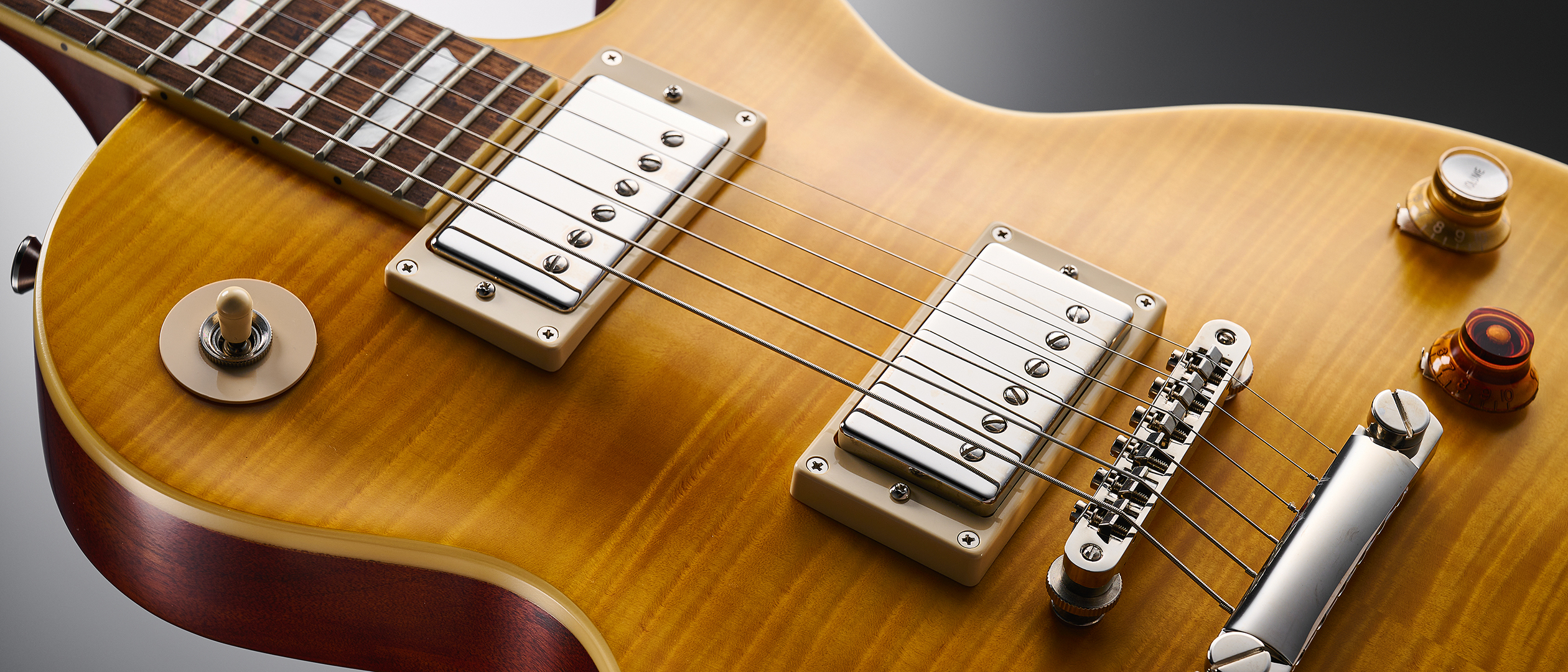MusicRadar Verdict
This collaboration between Epiphone and the Gibson Custom Shop has resulted in a stellar guitar that both companies can be proud of. With effortless playability and the credentials to absolutely nail those iconic Peter Green, Gary Moore and Kirk Hammett tones, this Les Paul is one of the best Epiphone guitars we've played in a very long time.
Pros
- +
The finishing is top-notch
- +
Best-sounding Epiphone we've ever played?
- +
Super comfortable neck
- +
Includes premium features such as a long neck tenon, Gibson USA pickups, mother-of-pearl inlays and retro-style case
Cons
- -
Not everyone will love the satin finish
- -
Despite the features, is £1,499 too expensive for an Epiphone?
MusicRadar's got your back
Epiphone Kirk Hammett "Greeny" 1959 Les Paul Standard: What is it?
When we think of mythical creatures, a few immediately jump to mind: the Basilisk, Chimera, Banshee, Griffin and, of course, the fabled '59 Gibson Les Paul. Now, unlike those other folklore legends, you can actually get your hands on Gibson's most sought-after singlecut – you just require friends in high places and a small fortune at your fingertips.
As far as "bursts" go, we'd argue that "Greeny" is the most famous example of them all. This beat-up '59 Les Paul has not only been owned by one high-profile artist, but three!
The guitar was initially purchased by blues guitarist extraordinaire Peter Green – that's where the Greeny nickname comes from – in the '60s. The legendary instrument would then go on to be used by Green extensively while performing with John Mayall & the Bluesbreakers as well as Fleetwood Mac. Gary Moore purchased the guitar from Green in the '70s, and the guitar's legend continued, being used to record the iconic solo of Parisienne Walkways and throughout the Irish guitarist's long career.
Jumping to 2014, and Metallica shredder-in-chief Kirk Hammett would become the new custodian of Greeny – reportedly spending a cool $2,000,000 for the privilege. Hammett can be seen putting the vintage Les Paul through its paces on tour and in the studio to this day.
Now, as you expect, Gibson has paid tribute to this historic guitar countless times, with the most recent versions including a £19,599 Custom Shop iteration and the more affordable £3,130 version from Gibson USA – but for the first time, Greeny has been given the Epiphone treatment, and that's what we're going to look at today.
Featuring the same Gibson USA Greenybucker pickups found in the Gibson Standard version, a long neck tenon, Switchcraft switch and output jacks, CTS potentiometers, Mallory capacitors, Grover Rotomatic tuners, mother-of-pearl inlays and Gibson's "open-book" headstock, Epiphone has pushed the boat out for their tribute to the most iconic Les Paul of all time – but does it deserve the £1,499 price tag? Let's find out.
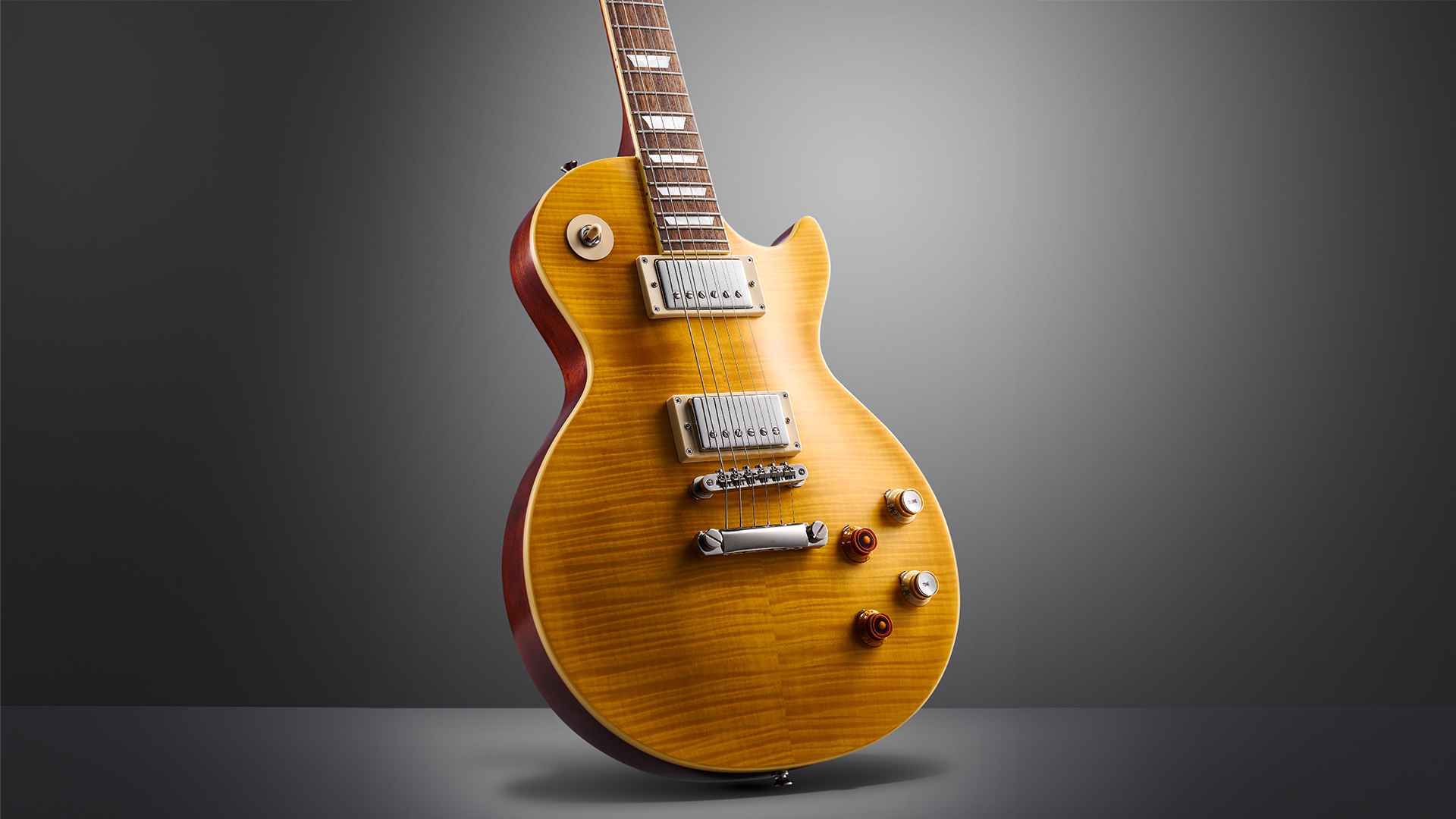
Epiphone Kirk Hammett "Greeny" 1959 Les Paul Standard: Performance and verdict
Aesthetics and features
Lifting the lid on the appropriately retro brown case, we were greeted with a rather striking-looking Les Paul. The sunny yellow hue of the body and the tight pinstripe flame top veneer looks every bit as good as we'd hoped. Travelling up the neck, which is peppered with real mother-of-pearl inlays – as opposed to pearloid, typically used on Epiphone instruments – and you get to the open-book headstock, which proudly displays the Epiphone logo.
Want all the hottest music and gear news, reviews, deals, features and more, direct to your inbox? Sign up here.
The Gibson-inspired headstock will always divide opinion – but this isn't the first time Epiphone has used this design. It was most notably used on a few sought-after Japanese exports. I'll be the first to admit that I don't usually like this headstock style on an Epiphone instrument – not because I feel it should be reserved for Gibson models, but because I think the Epiphone moniker can sometimes look too large for this design.
That said, after living with the guitar for several weeks, it's something I quickly got used to – and it's certainly a feature that sets the guitar apart from other models in the vast Epiphone catalogue.
Moving on to the finish, and Epiphone states that it's an aged gloss, but in reality, it feels like a full satin affair – which isn't a bad thing by any means. The finish is smooth and feels particularly good on the neck. So, if you were put off by the thick, over-glossy finishes Epiphone is guilty of using in the past, we think you'll be pleasantly surprised with the approach they have taken with this model – we certainly were.
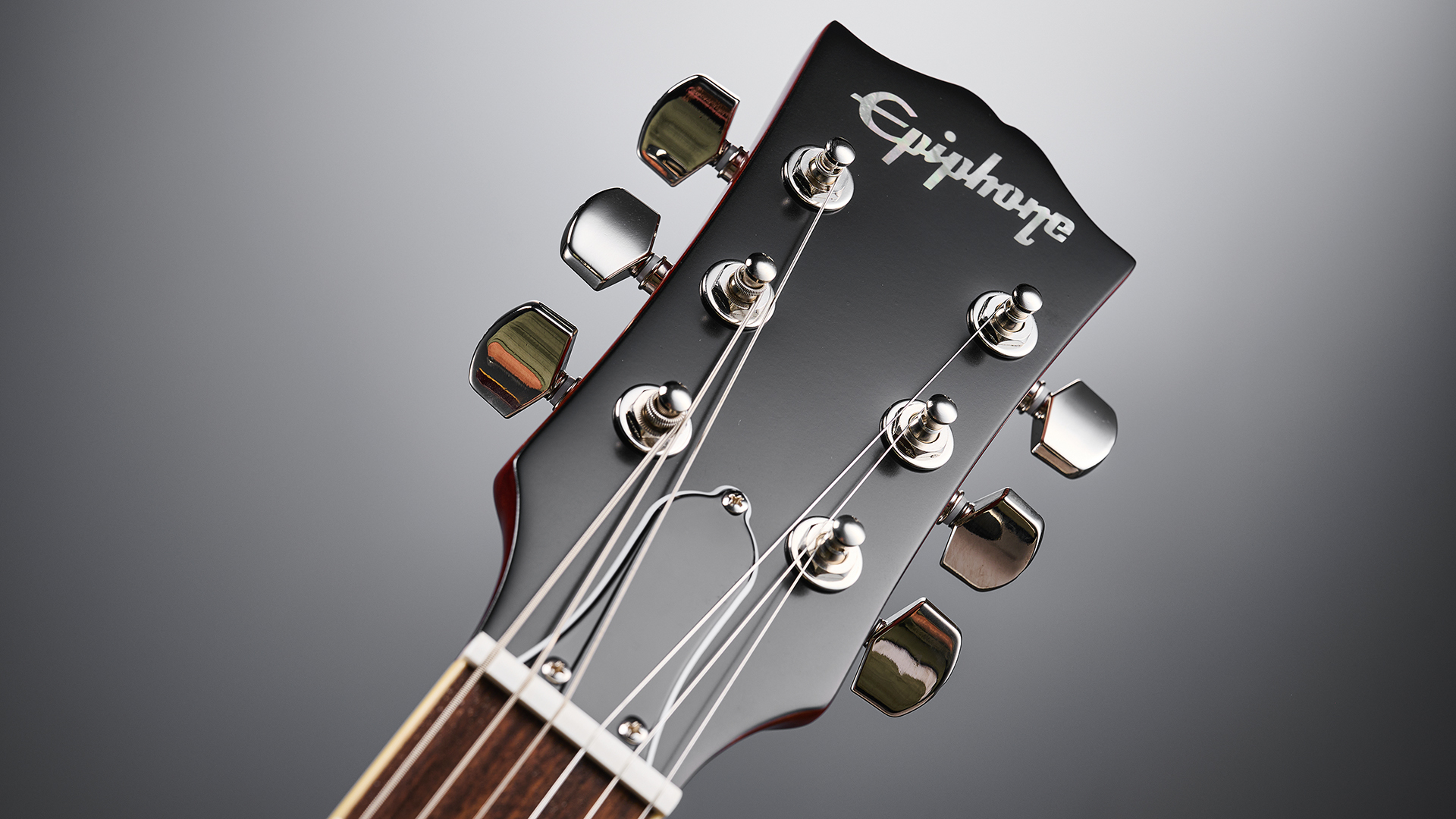
Playability and tone
Okay, so this Epiphone looks the part, but how does it play? In a nutshell, pretty damn well. The neck opts for the Custom Greeny Profile, which, despite being based on a '59 Les Paul, is pretty slim – even slimmer than our own trusty '60s reissue Gibson Les Paul Standard. This made the guitar easy to navigate and ideal for shredding our best pentatonic blues runs.
We are happy to report that the fretwork was on point, and there were no set-up-related issues to report. Straight out of the box, the guitar's action was nice and low, and there were no dead spots or sharp fret ends to speak of. If we were to nitpick, we'd expect the frets to be polished to a more glistening shine – especially at this price point – but we can live with them how they are.
There was just something so inviting about the feel of this guitar. The satin finish on the back of the neck, coupled with the slight profile, definitely helped create a lightning-fast neck that was a joy to hold – in fact, I don't think I've had so much fun playing an Epiphone guitar in a very long time.
The tonal heart of the Epiphone Greeny is a set of Gibson USA pickups. This model makes use of the Greenybucker set, which is present in this guitar's flashy big brother from the Gibson USA factory - and yes, just like the original guitar, the neck pickup is reversed mounted and utilises reverse magnetic polarity to achieve Peter Green's legendary middle position tone.
This guitar sounded incredible – and may just be the best-sounding modern Epiphone I've ever played. Now, Gibson has made many versions of their historic PAF pickups, but this particular iteration isn't simply another attempt at capturing the general essence of the pickups of the late '50s, but instead a courageous shot at mimicking the exact pickups in Peter Green's original electric guitar. Featuring asymmetrical coil windings and Alnico 2 magnets, these unpotted humbuckers are as close as you'll get to nailing the mythical sound of that famed '59 Les Paul.
In the neck position, the tone was thick, creamy and buttery, with a smooth attack and plenty of note definition. Flick the switch to engage the bridge pickup, and you'll be greeted with a bright, snappy tone that sounds every bit as good covered in copious amounts of distortion as it does laid bare with a sparse, clean tone.
Of course, in the middle position, you'll gain access to Peter Green's instantly recognisable out-of-phase tone. With both pickups engaged, the guitar is notably thinner, with a nasal quality that cuts like a knife.
It's fair to say we were mighty impressed with these pickups, and with the set being available to purchase directly from Gibson for £319, it's got us wondering if our Les Paul Standard is due an upgrade.
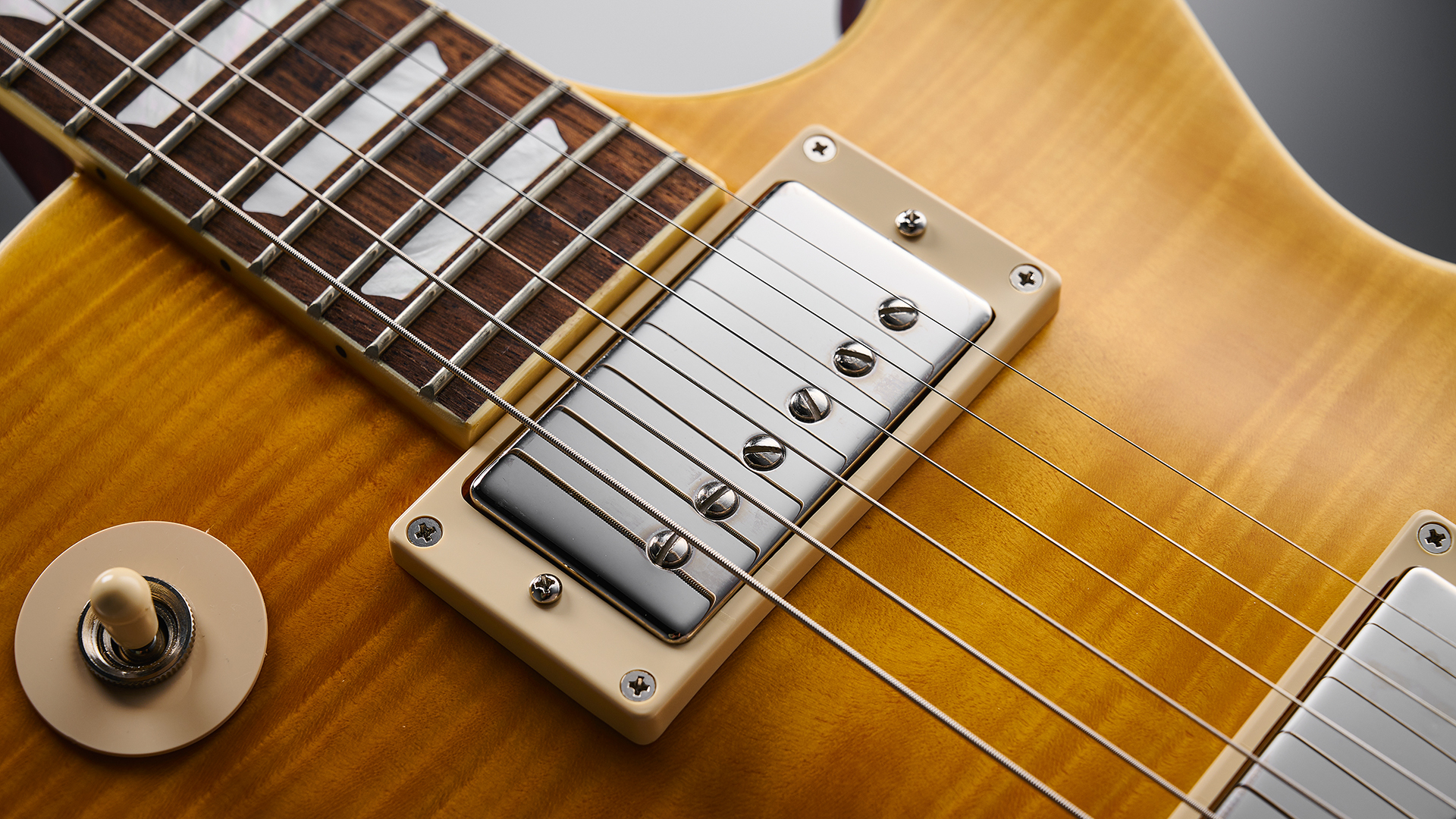
Verdict
There's a lot to love about the Epiphone Kirk Hammett "Greeny" 1959 Les Paul Standard. This collaboration between Epiphone and the Gibson Custom Shop has resulted in a stellar guitar that both companies can be proud of. With effortless playability and the credentials to absolutely nail those iconic Peter Green, Gary Moore and Kirk Hammett tones, this Les Paul is one of the best Epiphone guitars we've played in a very long time.
That said, there's still the pesky question about the price. Is £1,499 too much for an Epiphone? The argument that gets levelled towards this pricey tribute guitar is that you could just buy the Epiphone 1959 Les Paul Standard and a set of the Gibson Greenybucker pickups and save a couple of hundred pounds – but really, you won't get the same guitar. Sure, it would certainly be close, but the spec sheets won't line up perfectly.
It could be argued that you'd be better off spending your money on the newer Gibson Modern Lite, which comes in at the same £1,499 price tag. That way, you'd get an American-made instrument with Gibson on the headstock. But again, if you are looking for the Greeny specs, you won't be getting anywhere close to them with that modernised singlecut – you’d need to jump up to the USA Standard Greeny which will set you back around £3,000.
So, yes, this Les Paul is more expensive than many of the other models in the current Epiphone lineup. Still, whether the long neck tenon, real mother-of-pearl inlays, Grover machine heads, open-book headstock, and a vintage-style hard case are worth the extra cash is still up for debate – but it can't be denied that Epiphone has made a stunning guitar that more delivers on playability and tone.
MusicRadar verdict: This collaboration between Epiphone and the Gibson Custom Shop has resulted in a stellar guitar that both companies can be proud of. With effortless playability and the credentials to absolutely nail those iconic Peter Green, Gary Moore and Kirk Hammett tones, this Les Paul is one of the best Epiphone guitars we've played in a very long time.
Epiphone Kirk Hammett "Greeny" 1959 Les Paul Standard: The web says
"It’s quite simply the best-quality-level Epiphone Les Paul we’ve had in our hands and, to be honest, a considerably better proposition than some of Gibson USA’s low-end models. There’s some excellent craft here, a great finish and plenty of sounds to explore."
Guitar World
Epiphone Kirk Hammett "Greeny" 1959 Les Paul Standard: Hands-on demos
Guitarist
Peach Guitars
Epiphone Kirk Hammett "Greeny" 1959 Les Paul Standard: Specifications
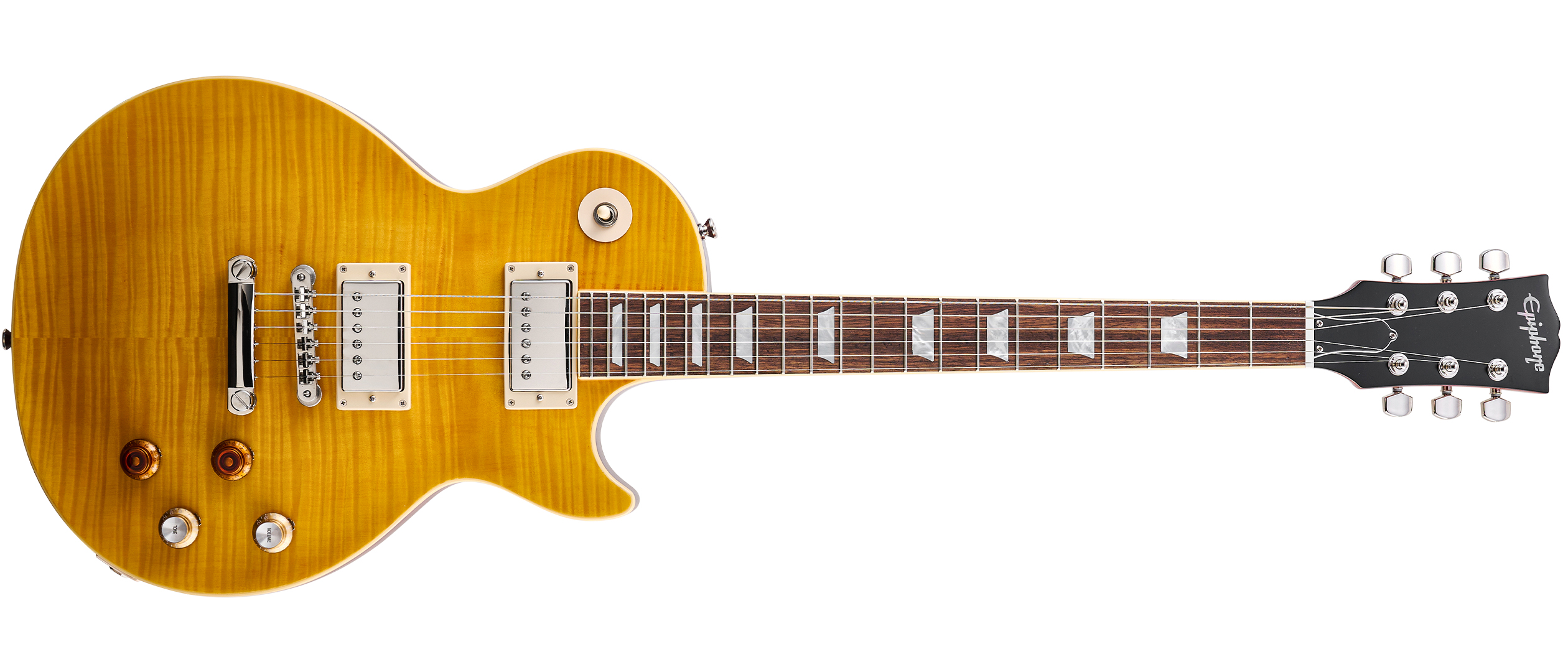
- Body Style: Les Paul
- Body Material: Mahogany
- Top: Maple with AAA Flame Maple Veneer
- Body Finish: Aged Gloss
- Neck: Mahogany (Long Tenon)
- Neck Profile: Custom Greeny Profile
- Frets: 22 Medium Jumbo
- Inlays: Mother of Pearl Trapezoid
- Nut Width: 43.0 mm / 1.692 in
- Bridge: Epiphone Tune-O-Matic
- Tailpiece: LockTone Stop Bar
- Tuning Machines: Grover Rotomatic with Spade Button
- Bridge Pickup: Gibson USA Greenybucker
- Controls: 2 Volume, 2 Tone, 50s Wiring, CTS Potentiometers, Mallory Capacitors
- Case: Vintage-style Hardshell with Tan Exterior, Pink Interior, and Custom Artwork
- CONTACT: Epiphone
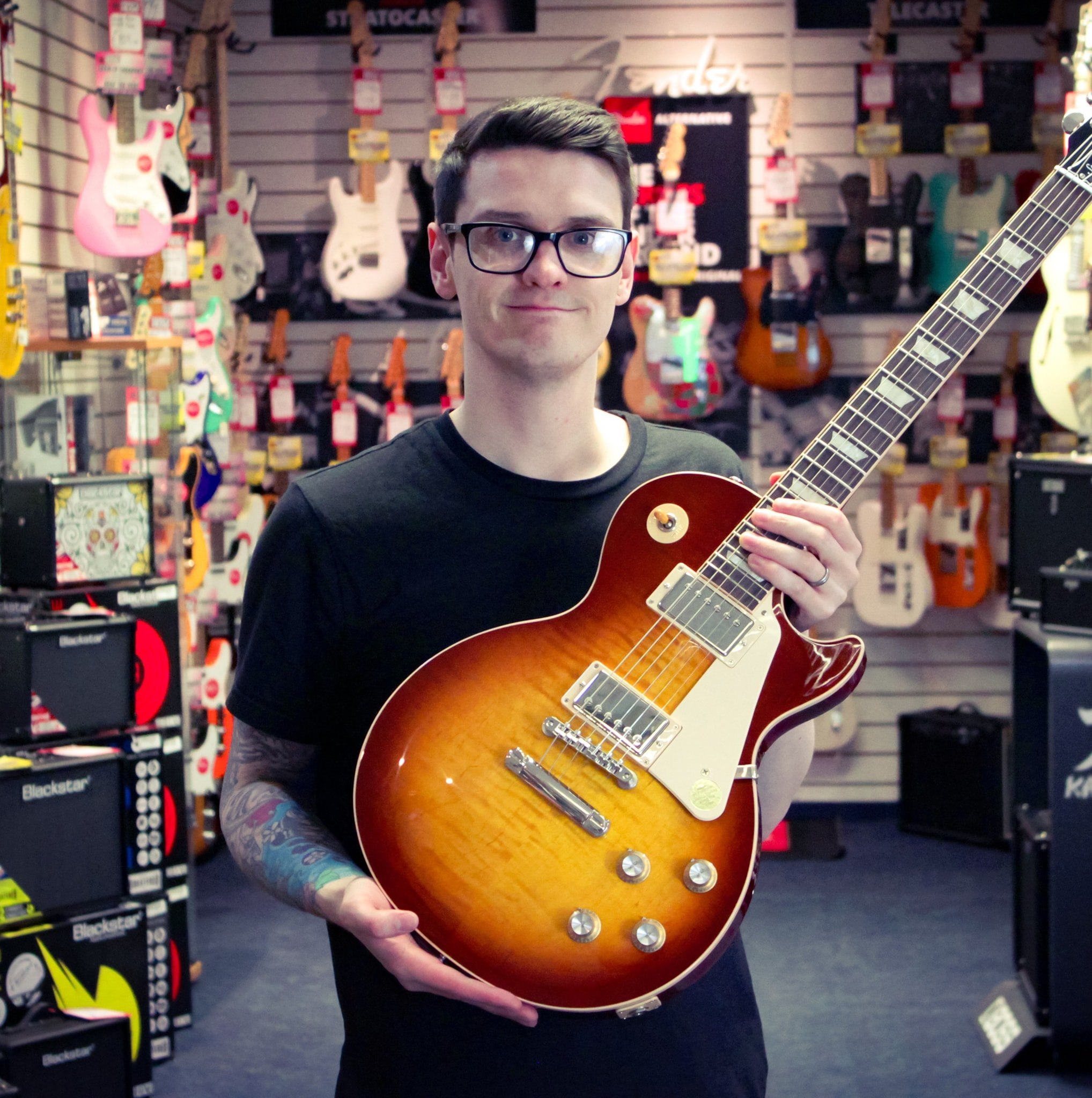
I'm a Senior Deals Writer at MusicRadar, and I'm responsible for writing and maintaining buyer's guides on the site. As part of my role, I also scour the internet for the best deals I can find on gear and get hands-on with the products for reviews. My gear reviews have been published in prominent publications, including Total Guitar, Guitarist, and Future Music, as well as Guitar World.com. I've also had the privilege of interviewing everyone from Slash to Yungblud, as well as members of Sum 41, Foo Fighters, The Offspring, and many more.
In a previous life, I worked in music retail, selling everything from digital pianos to electric guitars. I'm also a fully qualified sound engineer who holds a first-class Bachelor's degree in Creative Sound Production from the University of Abertay.
